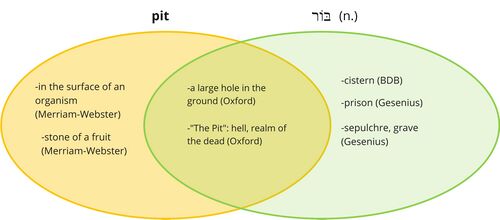Psalm 88/Notes/Lexical.V. 5.221613
From Psalms: Layer by Layer
- v. 5a: בּוֹר
- Many translations take בור literally as pit, translating the phrase as "those who go down to the pit" (NIV,ESV), some capitalize the word "those who go down to the Pit" (ISV), and some understand it metaphorically as "those who go down to the grave" (NET). Here the explicit translation is preferred.

- v. 5: The meaning of אֱיָל
- The noun אֱיָל is a hapax legomenonThat is, the term only occurs once in Biblical Hebrew. in the Bible. It is derived of the root אול with the primary polysemous meanings of "to be in front"/"to be strong"; comp. אֵל "god"; Arb. ʾawwal "first" (HALOT). BDB takes this noun as a loan-word from Aramaic with the meaning "help" (comp. Syr. ʾiyālā "help"). Also noteworthy is the derived noun אֱיָלוּת (Ps 22:20), also a hapax legomenon, which in the context of its psalm probably means "help". The noun אֱיָל is read as such in LXX (ἄνθρωπος ἀβοήθητος "a helpless man") and Peshitta (see ʾiyālā above). On the other hand, The Vulgate iuxta Hebr. has invalidus ("impotent") so as Targum which has בר נש דלית ליה חילא ("a man who has no strength").
- We prefer to follow Tate 1990, 396 who, like the Vulgate and Targum, reads אֱיָל as "strength". This reading, etymologically justified (see above), fits in better with the direct context: the noun גֶּבֶר (in contrast to אִישׁ) is often marked in terms of qualities of manhood such as courage and strength (see Venn Diagram below). The reading of אֱיָל as strength is backed by most modern translations (NIV, NLT, ESV, NKJV et alia).
- v. 5: גֶּבֶר
